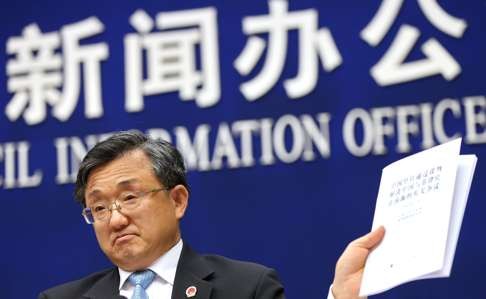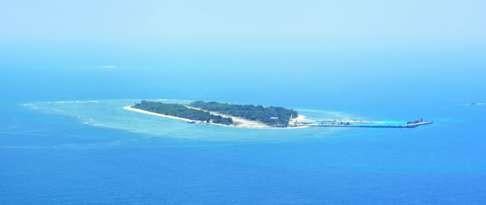
Why Beijing should seek damage control following the South China Sea decision
Michael Davis says the Hague ruling uncovers livelihood issues and environmental damage that China should attend to, if it is to change course and repair its reputation

It is time to get realistic over the South China Sea arbitral decision. Chinese officials and their supporters have made this case out to be some gross overreaching by the arbitral tribunal constituted under the United Nations Convention on the Law of the Sea.
A better view is that the tribunal properly exposed some serious violations that China ought to correct both for its own reputation and for the sake of the natural environment. At the same time, it offered a platform for negotiating a reasonable settlement. The following 10 points are worth considering.
First, we should appreciate that China signed on to the UN convention for good reason. Not traditionally a maritime power, the treaty offered China expanded rights in adjoining territorial seas, exclusive economic zones and the continental shelf, which would be rich in fisheries and minerals. Substantially hemmed in by its neighbours, China surely saw great advantage in embracing such treaty.
Second, by agreeing to the treaty, China agreed to the associated arbitration that has just taken place. If China refused to appear, the tribunal was required to proceed without it and was bound to consider as best it could what it judged to be China’s arguments.
Third, by refusing to appear, China waived its right to participate in selecting the five judges for the arbitration.

Fourth, China has argued that the 15 claims filed by the Philippines under the convention were barred because they involved territorial sovereignty, not covered by the convention, and they involved maritime delimitation, to which China had lodged a reservation as to the compulsory dispute procedure. The tribunal rightly rejected both of these arguments. The Law of the Sea treaty does not cover sovereign claims over disputed islands and the tribunal was not asked to decide such claims. The reservation over maritime delimitation specifically bars such arbitration to delimit overlapping claims to the territorial seas, the exclusive economic zones or the continental shelf. The tribunal earlier withheld judgment on jurisdiction for claims where it was yet to be determined if a particular island generated a 200 nautical mile exclusive economic zone that might overlap with that of the Philippines. Ultimately none did, so there were no barred claims.
Military-style barracks or fishermen dropping by do not constitute such habitation or sufficient economic life
Fifth, a critical question to the last point was to determine whether alleged islands extended above high tide, extended only above low tide or were always submerged. In the latter two cases, they could not be the subject of sovereign claims and could not generate any of the three maritime zones noted above. Such submerged islands are generally treated like the seabed. Only two alleged islands that were judged to be below high tide were effectively awarded to the Philippines because they were within the Philippines’ exclusive economic zone and, as the next item shows, were not the subject of competing exclusive economic zone claims. These were Mischief Reef, where China has built an artificial island, and Second Thomas Shoal.
Sixth, if an island is always above sea level even at high tide, then under the treaty’s Article 121, it will have at least a territorial sea. But even islands above high tide entitled to a territorial sea may not be entitled to an exclusive economic zone or a continental shelf if they “cannot sustain human habitation or economic life of their own”. They are then designated as “rocks” under Article 121(3). This was to avoid abuse of maritime rights by allowing substantial claims to attach to rocks or small islands that are not suited for establishing human communities. Military-style barracks or fishermen dropping by do not constitute such habitation or sufficient economic life. All of the islands that were identified were judged to be such “rocks”.

Seventh, no decision has been made about the sovereign claims to these various islands/rocks that are above sea level at high tide. So complaints from Taipei or Beijing that the tribunal has wrongly snatched Taiping Island from their hands are simply wrong. The tribunal in fact acknowledged that Taiping and several other outcroppings in the Spratly Islands and Scarborough Shoal are islands entitled to a territorial sea. The tribunal simply lacked jurisdiction to decide who owns them.
Eighth, the tribunal concluded, as was obvious to anyone, that China’s historical claim to the South China Sea within its nine dotted lines was not justified. The Chinese government has never explained what type of claim that could possibly be and by signing the UN treaty it was bound by that more usable framework.
Ninth, perhaps most damning, the tribunal found that China has permitted or caused enormous environmental damage to precious coral reefs across the region. I recommend any environmentally concerned person read the long analysis of this damage. We are not talking merely about destroying 60 per cent of coral reefs beside and under artificial islands but also Chinese fishermen fishing for endangered large clams and sea turtles by using ship propeller blades to essentially drill down to catch their prey, or alternatively, as the decision describes, blasting the reef. The tribunal has done a great service to the environment by bringing this thorough and expert-driven analysis to global attention. I recall in Hawaii that even walking on the reef is forbidden, much less blowing it up.

Tenth, finally, the tribunal found that Chinese patrol boats were not only blocking Filipino fishermen from the Philippine exclusive economic zone but were also allowing Chinese fishermen into such areas without consent. This is on top of actually building an artificial island at Mischief Reef in the Philippine exclusive economic zone.
None of these 10 items or others in the decision resolves issues of territorial sovereignty to islands or delimits overlapping maritime boundaries. The Chinese government says it favours goodwill negotiations to resolve disputes. The tribunal decision offers a good platform for realistic discussions. Such a course would surely redeem the Chinese government’s reputation after such a sorry affair.
Professor Michael C. Davis, of the University of Hong Kong, specialises in constitutional law and human rights